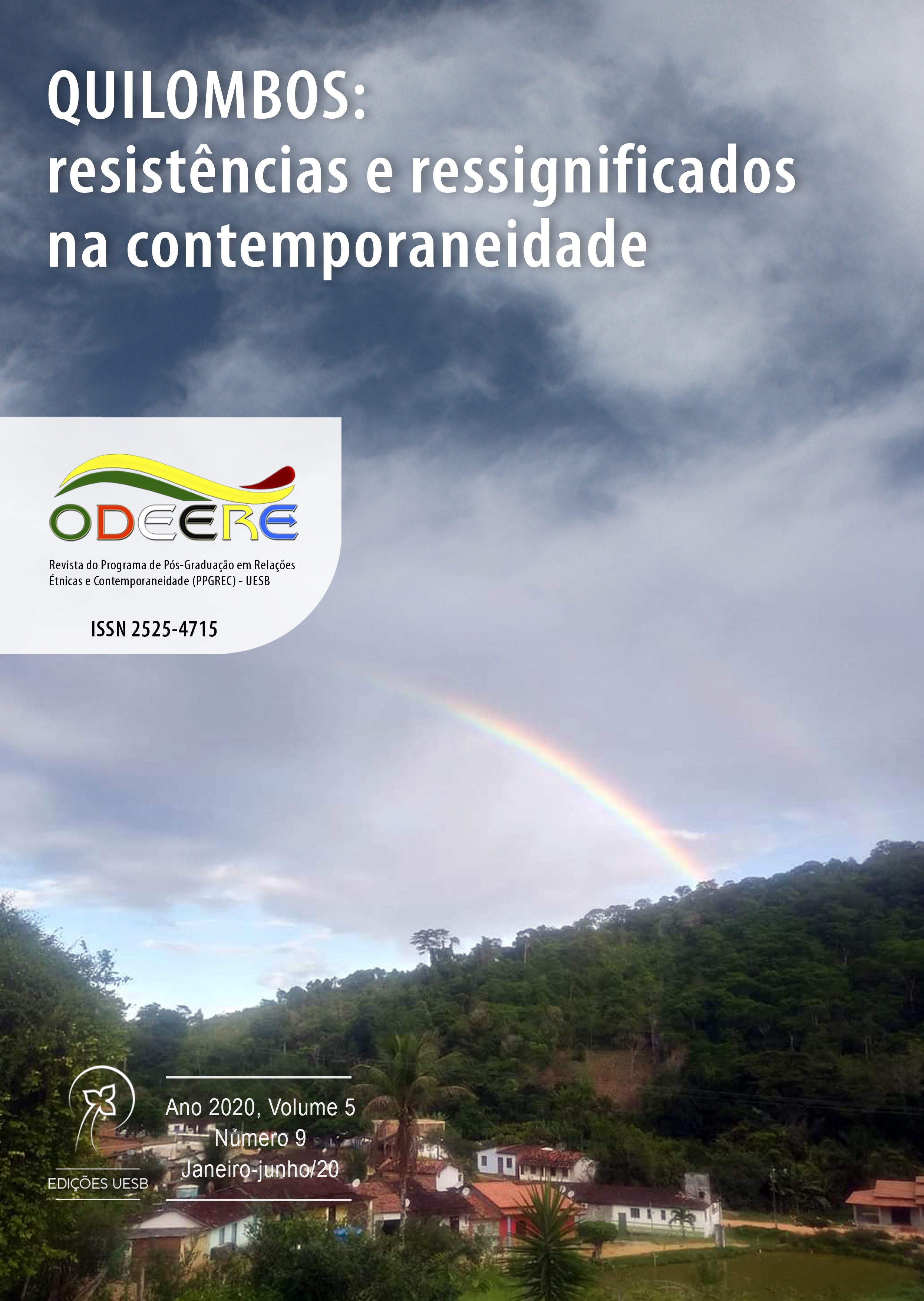KNOWLEDGE, TRAJECTORIES AND SOCIAL SPACE: reflective ethnography among quilombola communities
DOI:
https://doi.org/10.22481/odeere.v5i9.6582Keywords:
Quilombolas, Cosmopolítica, médio sertão maranhenseAbstract
The ethnographic research proposed to carry out an ethnographic sketch of the quilombola communities in the middle of the sertão of Maranhão, paying attention to the intrinsic elements of knowledge production. As methodological support, the interlocutions followed the bias of studies that privilege alterities and local knowledge as fundamental analytical assumptions. In this perspective, we seek to move away from most studies aimed at quilombola communities that focus on land struggles and recognition of rights as a central approach, however, we understand that these approaches were fundamental to foster the discussions on screen. The quilombola communities surveyed here were only certified by the Palmares Foundation in 2006, but for more than half a century these communities have maintained sociability relations and cultural exchanges. Nevertheless, our search for knowledge is based on knowledge, trajectories and conceptions of social space (territory) referenced in ecosophy. In this way, we will try to capture the processes of cosmopolitical, sociocosmological and anthropological creativity, emphasizing their own elaboration and construction of concepts. To that end, fieldwork was an extremely important methodological tool, combined with other methodologies, for example, oral history, ethnohistory and care for local language, fundamental elements inherent to the social sciences.
Keywords: Quilombola, Cosmopolitical, Maranhão
Downloads
References
BOURDIEU, Pierre. A distinção: crítica social do julgamento. Porto Alegre, RS: Zouk, 2015.
CAPRANZANO, Vincent. O dilema de Hermes: o disfarce da subversão na descrição etnográfica. In CLIFFORD, James & MARCUS, George. A escrita da cultura. Poética e política da etnografia. Rio de Janeiro: Editora UFRJ, Papeis Selvagens Edições, 2016.
CLIFFORD, James & MARCUS, George. A escrita da cultura. Poética e política da etnografia. Rio de Janeiro: Editora UFRJ, Papeis Selvagens Edições, 2016.
CLIFFORD, James. A experiência etnográfica. Antropologia e literatura no século XX. Rio de Janeiro: Editora da UFRJ, 2004.
DELEUZE, G & GUATTARI, F. Mil platôs: capitalismo e esquizofrenia. São Paulo: Ed. 34, 1997.
DELEUZE, Gilles. O abecedário de Gilles Deleuze. In Estudos Filosóficos. São Paulo: Abertos, 1989.
GIDDESN, Anthony. Em defesa da Sociologia. São Paulo: Editora da UNESP, 2001.
GIDDENS, Anthony. Social Theory and Modern Sociology. Stanford: Stanford University Press, 1995.
INGOLD, Tim. Antropologia. Para que serve? Rio de Janeiro, Editora Vozes, 2019.
INGOLD, Tim. Estar vivo. Ensaio, movimento, conhecimento e descrição. Rio de Janeiro: Editora Vozes. 2019.
LUCKMANN, Thomas. A construção social da realidade. Petrópolis: Vozes, 2014.
NASCIMENTO, L.A.S. &. RIBEIRO, Sheila Gomes. Diáspora e religiosidade de uma liderança quilombola no Médio Sertão Maranhense. São Luís: FAPEMA, Relatório Parcial, 2019.
SEGAUD, Marion. Antropologia do Espaço. São Paulo: SESC, sd.
STRATHERN, Marilyn. O efeito etnográfico. São Paulo: UBU Editora, 2017.
VIEIRA, Suzane A. Resistência e pirraça na malhada. Cosmologias quilombolas no Alto Sertão de Caetité. Rio de Janeiro: Tese de doutorado, Museu Nacional, UFRJ, 2015.
WAGNER, Roy. A invenção da cultura. São Paulo: Cosac & Naify, 2010.
ZOURABICHVILI, François. Vocabulário de Deleuze. Campinas: Centro Interdisciplinar de Estudos em Novas Tecnologias da Informação, Unicamp, 2014.
Downloads
Published
How to Cite
Issue
Section
License
Copyright (c) 2020 ODEERE

This work is licensed under a Creative Commons Attribution 4.0 International License.
You are free to:
Share - copy and redistribute the material in any medium or format; Adapt - remix, transform, and build from the material for any purpose, even commercially. This license is acceptable for Free Cultural Works. The licensor cannot revoke these freedoms as long as you follow the terms of the license.
Under the following terms:
Attribution - You must appropriately give credit, provide a link to the license, and indicate if any changes have been made. You may do so in any reasonable way, but not in a way that suggests that you or your use is endorsed by the licensor.
There are no additional restrictions - You cannot apply legal terms or technological measures that legally restrict others to make any use permitted by the license.














